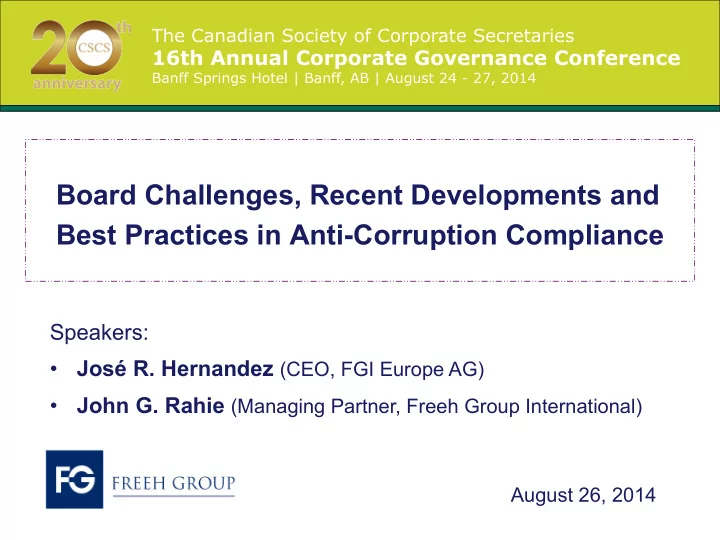

The Canadian Society of Corporate Secretaries 16th Annual Corporate Governance Conference Banff Springs Hotel | Banff, AB | August 24 - 27, 2014 Board Challenges, Recent Developments and Best Practices in Anti-Corruption Compliance Speakers: • José R. Hernandez (CEO, FGI Europe AG) • John G. Rahie (Managing Partner, Freeh Group International) August 26, 2014
Discussion Topics 1. Current Board challenges in compliance 2. Global enforcement and settlement trends 3. Best practices and suggested action items for compliance programs 2
Board challenges in ethics and compliance: Understanding the problem “Ethical Calculus” “Bad Apples” “Bad Barrels” (Un) Ethical (Individuals) (Organization) Decision-making Violations Crises Failures 3 Adapted from: Treviño, L. K., & Youngblood, S. A. 1990. Bad apples in bad barrels: A causal analysis of ethical decision making behavior. Journal of Applied Psychology, 75(4): 447-476.
Board challenge #1: Responding to “Bad Barrel” conditions 1. Widespread perception of Canadian tolerance 2. “Old school” director mindset and culture 3. Late start compared to global benchmarks 4
The Headlines: Tolerance in Canada (and its results) “‘What is happening in Canada?’: Country’s reputation with investors could take hit over Quebec corruption scandal” “One in five executives thinks corruption is widespread in Canada’s The Financial Post, June 21, 2013 business world, EY report shows” “White-collar crime hits more than a third of Canadian organizations” The Financial Post, June 11, 2014 The Globe and Mail, February 24, 2014 5
The “Old School” director mindset: Characteristics and warning signs (1) • Intellectually dependent on Company and/or others • Financially dependent on director remuneration • Conformist towards the “omnipotent” CEO/Chair • Abdicates governance to the CEO (incl. compliance program & investigations) • When in doubt, establishes new “committees” to diffuse responsibility • Unwilling or unable to “vote with their feet” 6
The “Old School” director mindset: Characteristics and warning signs (2) • Allows for double standards; does not hold top management accountable • Lack of follow-up; allows issues to fall through the cracks • “Hear no evil, see no evil” attitude (aka willful blindness), especially with respect to the activities of external third parties • Gauges company culture from an ivory tower 7
Board challenge #2: “Bad Apples” are inherited or created • Inherited from the old guard, or created by the established culture • Persist through double standards in hiring, promotion, and discipline • Insulated by perceived risks and benefits: e.g. institutional memory, continuity, business networks, risks of litigation and bad PR • Reinforce the importance of robust investigations, protection of whistleblowers, and training/communication 8
Enforcement and settlement trends (1): Canada’s CFPOA: Recent developments On June 19, 2013, amendments to the Corruption of Foreign Public Officials Act (CFPOA) came into force through Bill S-14. These include: • New maximum penalty • New books and records offence • Nationality jurisdiction • End to facilitation payments exception (TBD) 9
Enforcement and settlement trends (2): Canadian enforcement actions Notable prosecutions • Niko Resources Ltd. (2011; $9.5 million penalty) • Griffiths Energy Inc. (2013; $10.35 million penalty) • Nazir Karigar (2013; first individual convicted; three-year sentence) Ongoing investigations • RCMP currently engaged in 35+ investigations 10
Enforcement and settlement trends (4): The U.S. FCPA: Enforcement statistics 2014 60 50 40 30 20 DOJ SEC 10 0 2005 2006 2007 2008 2009 2010 2011 2012 2013 2014 (6/30) Source: Gibson Dunn, 2014 11
Enforcement and settlement trends (5): General trends in enforcement • Rise in settlement and investigation costs • Increased focus on individuals • “Hybrid” monitorships • Reliance on industry sweeps • Increasing legislation and international cooperation • Beyond corruption: Aggressive enforcement and rising penalties for various forms of anti-competitive and/or fraudulent conduct, including OFAC/sanctions violations; market manipulation, collusion, forex rigging; and tax evasion 12
Weaknesses in compliance programs today: A director’s perspective (1) • Persistence of bad habits: underlying attitudes and mindset have yet to evolve • Corruption and competition problems extend throughout the supply chain • Business models remain challenging, especially the use of commercial agents • Investigations are too narrow, lack independence/ competence, focused on the wrong questions 13
Weaknesses in compliance programs today: A director’s perspective (2) • Form over substance • Information/metrics provided are superficial • Leadership accountability and double standards (despite professed “zero tolerance”) • Reactive to crises, not proactive • Lacking sustainability and resources after “the storm has passed” 14
Suggested next steps For corporate secretaries and directors • Educate yourself. Don’t assume that you have all the answers. • Get expert assistance and support. • Don’t compromise. Know where you stand on all aspects of the program, including investigations. • Measure your progress; understand the “hard” and “soft” results. • Facilitate and engage in dialogue with GC, CCO, Head of Investigations, Internal Audit, HR, business leaders, as well Board colleagues. 15
For More Information José R. Hernandez , Ph.D. John G. Rahie Chief Executive Officer Managing Partner FGI Europe AG Freeh Group International hernandez@freehgroup.com rahie@freehgroup.com Tel: +1 (647) 271-3303 Tel: +1 (302) 436-2626 www.freehgroup.com www.freehgroup.eu
Appendix: Primer on compliance program elements (per World Bank guidelines) (1) 1. Prohibition of misconduct 2. Responsibility (leadership, individual, compliance function) 3. Program initiation, risk assessment, reviews 4. Internal policies (employee due diligence; arrangements with former public officials; gifts and hospitality; political contributions; donations and sponsorships; facilitation payments; recordkeeping; fraudulent, collusive, coercive practices)
Appendix: Primer on compliance program elements (per World Bank guidelines) (2) 5. Policies on business partners (due diligence, reciprocal commitment, documentation, remuneration, monitoring, etc.) 6. Internal controls 7. Training and communication 8. Positive incentives & discipline 9. Reporting (incl. whistleblowing) 10. Remediation (investigations and remedial actions) 11. Collective action
Recommend
More recommend